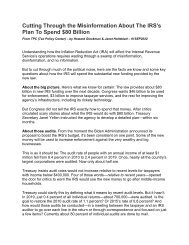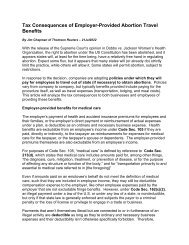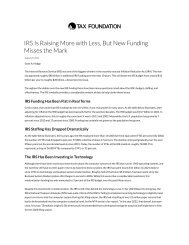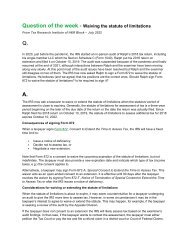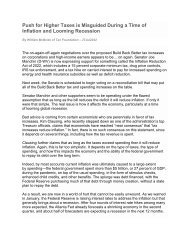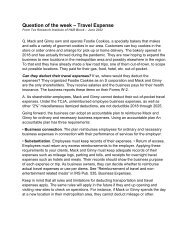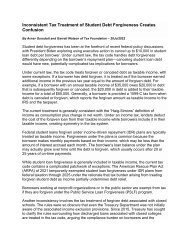Cutting Through the Misinformation About The IRS
Create successful ePaper yourself
Turn your PDF publications into a flip-book with our unique Google optimized e-Paper software.
<strong>Cutting</strong> <strong>Through</strong> <strong>the</strong> <strong>Misinformation</strong> <strong>About</strong> <strong>The</strong> <strong>IRS</strong>’s<br />
Plan To Spend $80 Billion<br />
From TPC (Tax Policy Center) – by Howard Gleckman & Janet Holtzblatt – 01SEP2022<br />
Understanding how <strong>the</strong> Inflation Reduction Act (IRA) will affect <strong>the</strong> Internal Revenue<br />
Service’s operations requires wading through a swamp of misinformation,<br />
disinformation, and no information.<br />
But to cut through much of <strong>the</strong> political noise, here are <strong>the</strong> facts we know and some key<br />
questions about how <strong>the</strong> <strong>IRS</strong> will spend <strong>the</strong> substantial new funding provided by <strong>the</strong><br />
new law.<br />
<strong>About</strong> <strong>the</strong> big picture. Here’s what we know for certain: <strong>The</strong> law provides about $80<br />
billion in new <strong>IRS</strong> funding over <strong>the</strong> next decade. Congress wants $46 billion to be used<br />
for enforcement, $3 billion to improve taxpayer services, and <strong>the</strong> rest for improving <strong>the</strong><br />
agency’s infrastructure, including its rickety technology.<br />
But Congress did not tell <strong>the</strong> <strong>IRS</strong> exactly how to spend that money. After critics<br />
circulated scary stories about what <strong>the</strong> <strong>IRS</strong> would do with $80 billion, Treasury<br />
Secretary Janet Yellen instructed <strong>the</strong> agency to develop a detailed plan—within six<br />
months.<br />
<strong>About</strong> those audits. From <strong>the</strong> moment <strong>the</strong> Biden Administration announced its<br />
proposal to boost <strong>the</strong> <strong>IRS</strong>’s budget, it’s been consistent on one point. Some of <strong>the</strong> new<br />
money will be used to increase enforcement against <strong>the</strong> very wealthy and big<br />
businesses.<br />
This is as it should be: <strong>The</strong> audit rate of people with an annual income of at least $1<br />
million fell from 8.4 percent in 2010 to 2.4 percent in 2019. Once, nearly all <strong>the</strong> country’s<br />
largest corporations were audited. Now only about half are.<br />
Treasury insists audit rates would not increase relative to recent levels for taxpayers<br />
with income below $400,000. Four of those words—relative to recent years—opened<br />
<strong>the</strong> door for critics to warn <strong>the</strong> <strong>IRS</strong> would use <strong>the</strong> new money to go after middle-income<br />
households.<br />
Treasury could clarify this by defining what it means by recent audit levels. But it hasn’t.<br />
In 2019, just 0.4 percent of all individual returns—about 700,000—were audited. Is <strong>the</strong><br />
goal to restore <strong>the</strong> 2010 audit rate of 1.1 percent? Or 2015’s rate of 0.8 percent? And<br />
how would those audits be conducted—in a meeting between <strong>the</strong> taxpayer and an <strong>IRS</strong><br />
auditor to go over each line in <strong>the</strong> return or through correspondence and focused on just<br />
a few items? Currently about 80 percent of individual audits are done by mail.
Maybe <strong>the</strong> better question is what is <strong>the</strong> optimal audit rate and method, given <strong>the</strong> new<br />
resources?<br />
Next question: Does <strong>the</strong> <strong>IRS</strong> plan to use less burdensome tools in its enforcement<br />
arsenal, short of audits?<br />
For example, <strong>the</strong> agency currently matches Forms W-2 and 1099 to individual income<br />
tax returns. If it finds a discrepancy above a threshold dollar amount, it will notify <strong>the</strong> tax<br />
filer.<br />
In 2018, <strong>the</strong> <strong>IRS</strong> received 2.8 billion information returns and detected 22.3 million<br />
discrepancies. But it could afford to select just 2.9 million of <strong>the</strong> mismatches for fur<strong>the</strong>r<br />
review. That’s about half <strong>the</strong> rate of a decade ago. Should that historic rate be restored?<br />
<strong>About</strong> those 87,000 armed agents. In May 2021, <strong>the</strong> Biden Administration projected<br />
<strong>the</strong> <strong>IRS</strong> would hire 86,852 new employees over <strong>the</strong> next decade if Congress approved<br />
<strong>the</strong> $80 billion. But it never provided a detailed breakdown of what types of positions<br />
would be filled.<br />
Republicans filled <strong>the</strong> information vacuum with <strong>the</strong> specter of 87,000 armed <strong>IRS</strong> agents<br />
terrorizing innocent people.<br />
That’s ludicrous. Less than 3 percent of <strong>IRS</strong> employees are authorized to carry<br />
weapons. <strong>The</strong>y are agents of its Criminal Investigations unit whose targets typically are<br />
drug dealers, money launderers, and o<strong>the</strong>rs suspected of serious, often-violent, crimes.<br />
<strong>The</strong> <strong>IRS</strong> is currently hiring about 300 more.<br />
And <strong>the</strong> critics willfully ignored some breadcrumbs in those 2021 Administration<br />
estimates: Some of those new hires would work in taxpayer services or technology.<br />
More recently, Administration officials asserted that 50,000 of <strong>the</strong> new hires would<br />
replace retirees.<br />
Still unanswered: Will <strong>the</strong> new hires do <strong>the</strong> same work as <strong>the</strong> people <strong>the</strong>y are replacing,<br />
or will <strong>the</strong> <strong>IRS</strong> create new positions more suitable for <strong>the</strong> 21 st century? <strong>The</strong> answer has<br />
implications for <strong>the</strong> type of agency <strong>the</strong> <strong>IRS</strong> will be in <strong>the</strong> future.<br />
<strong>About</strong> hiring. Senator Rick Scott (R-FL) warns people not to take jobs with <strong>the</strong> <strong>IRS</strong>. If<br />
Republicans take Congress in January, he says, <strong>the</strong> $80 billion will be history and those<br />
new hires will lose <strong>the</strong>ir jobs. Well, that’s not true. Biden still would hold <strong>the</strong> veto pen,<br />
and civil service rules make it hard to fire government workers.<br />
But it already is tough for <strong>the</strong> <strong>IRS</strong> to hire in today’s competitive market. At <strong>the</strong> last<br />
minute, Congress dropped from <strong>the</strong> IRA provisions that would have made it easier for<br />
<strong>the</strong> <strong>IRS</strong> to recruit. But Congress can restore that language in future spending bills, and<br />
<strong>the</strong> Office of Personnel Management has discretionary authority to do <strong>the</strong> same.
<strong>About</strong> <strong>the</strong> consequences. Disinformation, misinformation, and no information have<br />
consequences. <strong>The</strong> scariest has been increasing threats against <strong>IRS</strong> employees,<br />
causing <strong>the</strong> agency to review its security procedures for <strong>the</strong> first time since <strong>the</strong> 1995<br />
bombing of <strong>the</strong> federal building in Oklahoma City.<br />
And that raises <strong>the</strong> biggest question of all: Who will take a job at <strong>the</strong> <strong>IRS</strong> with a target<br />
on <strong>the</strong>ir back?<br />
Posts and comments are solely <strong>the</strong> opinion of <strong>the</strong> author and not that of <strong>the</strong> Tax Policy<br />
Center, Urban Institute, or Brookings Institution.



